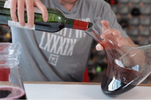
Does A Wine Decanter Need A Stopper?


Wine is probably the most intricate liquor known to man. There are a lot of factors to be considered when drinking wine, including the question, "does a wine decanter need a stopper?" This could be mundane to the untrained but to the seasoned drinker, the right tools can spell the difference in the quality, aroma, and flavors of your wine.
First off, consider if your red wine is old or young. Decanting a young red is different from decanting an old red. Wines older than 15 years old should not be decanted while younger reds can be decanted longer - at least 30 minutes.
Second, sulfur compounds. Sulfites are high in wines with a pH of less than pH 3.6, white wines, dessert wines, and wines stored in warm temperatures. But sulfites are not all that bad. They work to slow down chemical reactions so the wine can stay for longer. Sulfites in the wine can smell like a rotten egg but not too bad that decanting and chilling can fix.
You don’t need a stopper for your wine decanter if you can finish your decanted wine in a single sitting. Decanting aims to aerate your wine, soften the tannins, and release the sulfites to make drinking more pleasurable.
When you buy a decanter, it is best if it comes with a stopper but if it does not, buying a separate stopper may not always be the solution.
Yes, as the need to stop the aeration of the wine may arise unexpectedly. If you are expecting guests and some that you were expecting didn't make it, then you might end up with more decanted wine than you would want.
An airtight stopper can be used to preserve the shelf-life of decanted wine. However, don't think that a decanter with a stopper is foolproof. Drink this wine within 2-3 days before it loses its flavor and aroma.
No. When buying a decanter, it does not need to have a stopper. If it comes with one, it can do wonders when you have to keep your wine in the decanter for a little longer. If not, you can always buy cork stoppers, though this can be tricky. Be sure to measure the inside diameter of the decanter to determine what size of cork stopper to buy.
Should I decant my wine? As pointed out before, wine taste is subjective. Your taste may be influenced by others but others' opinions don't have to be always right according to your taste.
As a general rule, you decant young red wines and some white wines.
You might be tempted to look for a decanter that will work for all wines. That's the case, isn't it? Unfortunately, it is not. Your best choice is to find a great all-purpose wine decanter. There are decanters for old wines, only to remove the sediments, not to aerate. There are also decanters for young wines. These are the wines with a huge bowl and a long neck that you can hold when swirling the wine.
Here are some tips to decant your wine and where wine stoppers apply.
Younger wines take a long time to be ready, at least 30 minutes. Following these steps can ensure that your wine is properly decanted.
So, we're back to the question: does a wine decanter need a stopper? To save your wine from becoming stale after sitting on the counter for an extended period of time, you need a stopper. An airtight stopper can delay the oxidation process, giving you more time to finish your decanted wine.
A stopper can also prevent your wine from getting contaminated. While bacteria are acceptably present in wine to facilitate the fermentation process, too much bacteria can result in the mousy smell of the wine. Once the wine is contaminated, it can no longer be undone, which is unfortunate.
Be sure to serve your wine at the right temperature to enjoy it well. Know your wine’s temperature by using this flexible wine bottle thermometer.
